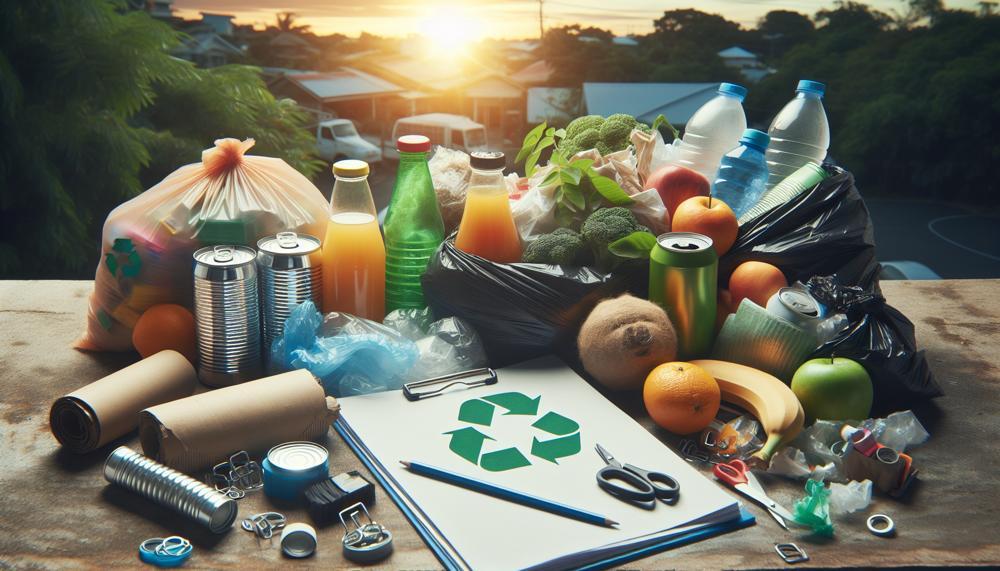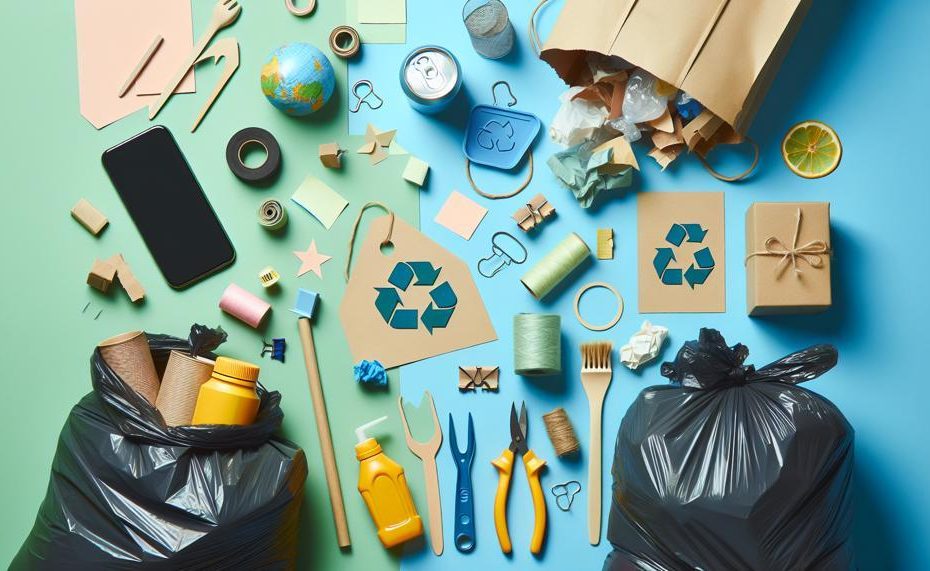Welcome to our blog, where we are dedicated to creating a better and more sustainable world for all. Today, we want to tackle a question that may seem insignificant but has a significant impact on our environment – can you recycle garbage bags?
- Did you know that every year, over 8 billion pounds of plastic end up in the ocean, harming marine life and polluting our waters?
- And did you know that traditional plastic garbage bags can take hundreds of years to decompose, releasing harmful chemicals into the soil and air?
- These alarming facts highlight the urgent need for us to reduce and recycle our plastic waste.
- Recycling garbage bags is a simple yet powerful way to do just that.
- By choosing to recycle your used garbage bags, you can actively contribute towards decreasing the amount of plastic waste in landfills and oceans.
- The best part? It’s an easy habit to incorporate into your daily routine.
So let’s delve deeper into the benefits of recycling garbage bags and discover how you can effortlessly make a positive impact on our planet. Together, let’s strive towards a cleaner and greener future for generations to come.
Contents
- 1 Can You Recycle Garbage Bags?
- 2 The Importance of Proper Disposal of Garbage Bags
- 3 Can You Recycle Garbage Bags? Factors That Affect Recycling
- 4 How to Recycle Garbage Bags at Home: Creative Ways to Repurpose Them
- 5 Specialized Recycling Facilities for Garbage Bags: What You Need to Know
- 6 Alternatives to Plastic Garbage Bags: More Eco-Friendly Options
- 7 The Role of Education in Promoting Sustainable Waste Management Practices
- 8 Conclusion
Can You Recycle Garbage Bags?
Recycling garbage bags is a complex process that involves sorting, cleaning, and processing the plastic materials. These bags are mainly made from polyethylene, a petroleum-based material that is not biodegradable and can take hundreds of years to decompose.
Therefore, proper recycling is crucial to minimize its environmental impact.
| Step | Description |
| 1 | Sorting: The first step in recycling garbage bags is to sort them based on their type of plastic, size, and color. This can be done manually or using advanced infrared technology in automated machines. |
| 2 | Cleaning: Once sorted, the garbage bags are shredded into small pieces and washed thoroughly to remove any residue or contaminants. |
| 3 | Melting: The cleaned plastic pieces are then melted down and formed into tiny pellets. |
| 4 | Reusing: These pellets can be used to create various new plastic products, including bottles, containers, and even new garbage bags. |
However, not all garbage bags can be recycled due to factors such as the type of plastic used, color of the bag, and any additional materials like drawstrings or labels. It is crucial to consult your local recycling facilities or waste management company for specific guidelines.
The Importance of Proper Disposal of Garbage Bags
Improper disposal of garbage bags can have severe consequences for both the environment and human health. These consequences can have long-term impacts on our surroundings and the future of our planet.
- Soil contamination is a major concern when it comes to improper disposal of garbage bags. When waste is disposed of in landfills or uncontrolled dumpsites, it can leak harmful chemicals and toxins into the soil. This not only affects the plants and animals living in that soil, but it can also contaminate our food supply if those plants are consumed by humans.
- Water pollution is another significant effect of improper disposal of garbage bags. When these bags end up in our water bodies, such as rivers, lakes, and oceans, they release harmful chemicals and toxins into the water. This not only harms marine life but also poses a serious threat to human health if we consume contaminated water.
- Moreover, improper disposal of garbage bags can contribute to air pollution. When these bags are burned or decompose, they release harmful chemicals into the air, adding to air pollution. This can have detrimental effects on human health, especially for those with respiratory issues.
- Habitat destruction is a direct consequence of improper disposal of garbage bags. When these bags end up in natural habitats, they can suffocate and harm animals and plants, disrupting entire ecosystems.
In addition to these consequences, improper disposal of garbage bags also contributes to climate change. The production and disposal of plastic bags release greenhouse gas emissions, exacerbating global climate change.
Overall, it’s essential to properly dispose of all waste, including plastic bags, to minimize these negative effects and protect our planet for future generations.
Can You Recycle Garbage Bags? Factors That Affect Recycling
When it comes to recycling garbage bags, there are several factors that can affect their recyclability. Let’s take a closer look at some of these factors and how they can impact the fate of your garbage bag.
- Firstly, the type of material used to make garbage bags is a crucial factor to consider. Most garbage bags are made from plastic, which is not easily recyclable. Specifically, plastic materials such as polyethylene or polypropylene fall under the category 7 plastics, which have a low market value and are challenging to separate from other types of plastics. This significantly decreases the chances of plastic garbage bags being recycled.
- Moreover, the presence of contaminants in garbage bags can also make them non-recyclable. Contaminants such as food waste, chemicals, or oils can severely affect the recyclability of garbage bags. For instance, if a garbage bag contains food waste, it can attract pests and cause hygiene issues during the recycling process. Similarly, chemicals and oils can contaminate the entire batch of recyclable materials, rendering them unusable.
- The way garbage bags are disposed of can also play a significant role in their recyclability. If not properly disposed of in designated recycling bins, garbage bags can end up in landfills where they take hundreds of years to decompose and release harmful toxins into the environment. This not only undermines recycling efforts but also poses a threat to the environment and public health.
- Consumer awareness is crucial when it comes to increasing the recyclability of garbage bags. Many people are not aware that these bags can be recycled, leading to improper disposal and contamination. It is vital for consumers to understand the importance of proper disposal and recycling of garbage bags to ensure their recyclability.
- Finally, the availability of recycling infrastructure is another factor that can significantly impact the recyclability of garbage bags. In some areas, there may not be adequate facilities or programs in place to recycle plastic bags, making it challenging for consumers to dispose of them properly. This highlights the need for improved recycling infrastructure to facilitate the proper disposal and recycling of garbage bags.
How to Recycle Garbage Bags at Home: Creative Ways to Repurpose Them

| DIY Crafts: Creative Ways to Repurpose Plastic Bags | ||
| Idea | Description | Materials Needed |
| Stylish Bracelets | Braid or weave plastic bags to create fashionable and eco-friendly bracelets. | Plastic bags, scissors |
| Jewelry Beads | Cut plastic bags into thin strips, roll them, and glue them together to make unique and colorful jewelry beads. | Plastic bags, scissors, glue |
| Durable Belt | Braid or weave plastic bags to make a sturdy and water-resistant belt. | Plastic bags, scissors, needle and thread |
| Crochet Rugs | Cut plastic bags into strips and crochet or knit them into durable and waterproof rugs. | Plastic bags, crochet hook or knitting needles |
| DIY Clocks | Create a clock by covering a cardboard base with cut-up plastic bags in different colors. | Plastic bags, cardboard, clock mechanism kit |
| Durable Coin Purses | Sew together plastic bags to make a long-lasting and water-resistant coin purse. | Plastic bags, scissors, needle and thread |
| Unique Flowerpots | Cut plastic bags into strips and weave them around a pot to create a one-of-a-kind flowerpot. | Plastic bags, scissors, pot |
| Decorative Flowers | Cut plastic bags into different shapes and colors to create beautiful flower decorations. | Plastic bags, scissors |
| DIY Hair Accessories | Cut plastic bags into strips and tie them together to make hair ties or headbands. | Plastic bags, scissors |
| Waterproof Hanging Chair | Weave plastic bags together to create a comfortable and water-resistant hanging chair. | Plastic bags, rope, cushion |
| Durable Pencil Pouch | Sew together plastic bags to make a long-lasting and water-resistant pencil pouch. | Plastic bags, scissors, needle and thread |
Specialized Recycling Facilities for Garbage Bags: What You Need to Know
Garbage bags may seem like a small issue when it comes to recycling, but their proper handling and processing is crucial for a more sustainable future. This is where specialized recycling facilities come into play, utilizing advanced technology and equipment to ensure these plastic materials are recycled efficiently. Let’s take a closer look at the process involved:
- Collection and Sorting: Whether collected through curbside pickup or dropped off at designated centers, garbage bags are sorted by type and color for efficient processing.
- Shredding: Next, the bags are shredded into small pieces, making them easier to handle and process.
- Washing: To remove any dirt or debris, the shredded plastic pieces are thoroughly washed.
- Melting: The clean plastic is then melted down into a liquid form.
- Extrusion: The melted plastic is then extruded through a machine, creating long strands similar to spaghetti noodles.
- Pelletizing: These strands are cut into small pellets and cooled down to solidify.
- Transportation and Reuse: The pellets are then transported to manufacturers who use them to create new products such as plastic lumber, trash cans, or even new plastic bags.
To prevent contamination, specialized recycling facilities have measures in place, including optical scanners that detect non-recyclable materials and manual inspection by trained workers.
Alternatives to Plastic Garbage Bags: More Eco-Friendly Options
When it comes to disposing of waste, there are plenty of options for eco-conscious individuals looking to reduce their use of traditional plastic garbage bags. From biodegradable and compostable alternatives to reusable and recycled materials, let’s take a closer look at some of the most popular options on the market.
| Alternative | Material | Description |
| 100% Compostable Trash Bags by Unni | Certified, labeled, and capable of breaking down completely in 180 days. | These trash bags offer a sustainable option for disposing of waste without contributing to plastic pollution. They are made from plant-based materials and are certified by municipal composting organizations. |
| Reusable trash bags by Planet Wise | Recycled materials | Looking for a more long-term solution? These five-gallon reusable trash bags are made from recycled materials and can be used over and over again. By choosing these reusable bags, you can help reduce the use of single-use plastics. |
| Reusable recycling and garbage bag by KAN Bags | Recycled materials | This bag is specifically designed for separating recyclables from regular waste. It is made from recycled materials and can be used multiple times before needing to be replaced. |
| Paper lawn bags | Biodegradable material | Paper lawn bags, like the ones sold at Home Depot, offer a strong and durable alternative for disposing of compostable or recyclable waste. Plus, they are biodegradable, making them an environmentally friendly choice. |
| Biodegradable trash bags by Okkeai | Plant starch | Made from plant starch, these trash bags are biodegradable and offer a simple alternative to traditional plastic bags. They are suitable for disposing of household waste and help reduce plastic pollution in the environment. |
| Recycled plastic Evolution Trash Bags | Recycled materials | For a greener option, consider these trash bags made from recycled plastic. Not only are they strong and convenient, but they also help reduce the use of traditional plastic bags. |
| Paper bags or newspaper lining | Biodegradable material | Sometimes the simplest solutions are the best. Consider using paper bags or newspaper lining as an eco-friendly alternative to traditional plastic bags. These can easily contain waste without contributing to plastic pollution. |
The Role of Education in Promoting Sustainable Waste Management Practices
Education holds immense potential in promoting sustainable waste management practices and raising awareness about the significance of recycling trash bags. By imparting knowledge to individuals and communities regarding the detrimental impacts of improper waste disposal, the financial advantages of recycling, and alternative waste disposal techniques, education can inspire them to adopt more environmentally-friendly habits.
Moreover, education can also play a crucial role in fostering a culture of sustainability within communities.
By providing education on sustainable waste management practices, individuals can learn how to reduce their waste production and properly sort and recycle their garbage.
This not only benefits the environment but also has economic benefits by reducing the cost of waste management for local authorities.
Conclusion
In conclusion, the devastating impact of plastic waste on our environment cannot be ignored. Every year, over 8 billion pounds of plastic end up in our oceans, causing harm to marine life and ecosystems. The decomposition process for traditional plastic garbage bags can take hundreds of years, leaving a lasting negative impact on our planet. It is imperative that we take action to reduce our plastic waste and contribute towards a cleaner and greener future.
Recycling garbage bags is a simple yet powerful way to make a positive impact. By properly sorting and recycling our used garbage bags, we can decrease the amount of plastic in landfills and oceans, preventing further harm to our environment. This small action may seem insignificant, but when multiplied by millions of individuals making conscious choices, it can lead to significant change.
Education also plays a vital role in promoting sustainable waste management practices. By educating individuals on the detrimental effects of improper waste disposal and providing them with alternative options, we can inspire them to make more eco-friendly choices.





